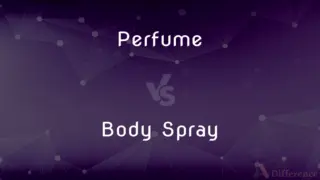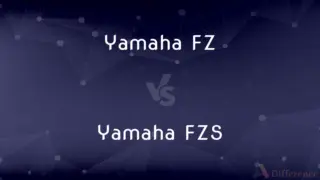Is vs. Has Been — What's the Difference?
By Tayyaba Rehman — Published on November 26, 2023
"Is" presents a current state or action, while "has been" indicates a past action that relates to the present, often used in the present perfect tense.

Difference Between Is and Has Been
Table of Contents
ADVERTISEMENT
Key Differences
The verb "is" stands as a singular form of the verb "be," signaling a state or condition in the present tense. It conveys a current situation, characteristic, or identity. "Is" is applied to singular subjects, linking the subject to a state of being, condition, or attribute. For instance, in the sentence "She is a doctor," "is" links the subject "She" to the attribute of being a doctor, designating a current status or role.
Contrarily, "has been" incorporates an aspect of time into the scenario, referencing an action that began in the past and carries implications for the present state. "Has been" is utilized in the present perfect tense, expressing a continuous action from the past to the present. When stating "He has been studying," it implies that "He" began studying in the past and continues to study now, highlighting an ongoing action.
"Is," with its focus on the present, does not provide information about any preceding actions or states. It strictly relates to the current moment, facilitating expressions about identities, states, or locations. For instance, “The cat is on the roof” provides current location information about the cat, without detailing any historical context or previous locations.
"Has been," offering a temporal bridge, conveys a sustained activity or condition spanning from past to present. It imparts that an action was initiated in the past and has either continued into the present or has an impact on the current situation. So, saying “She has been to Paris” implies a past action (visiting Paris) that is relevant to the present context.
While "is" typically necessitates a complement to describe or identify the subject, "has been" can stand alone or be followed by a present participle, introducing an element of ongoing action. "Is" illustrates an immediate state: “The window is open.” Conversely, “The shop has been open” suggests the shop opened at some point in the past and remains open, intertwining past actions with the present state.
ADVERTISEMENT
Comparison Chart
Tense
Present
Present Perfect
Time Frame
Current Moment
Past Action Related to Present
Use
Links Subject to State/Attribute
Indicates Ongoing Past to Present Action
Form
Singular of Be
Has/Have + Been
Example Usage
The cat is happy.
The cat has been happy.
Compare with Definitions
Is
Third person singular of be.
He is a lawyer.
Has Been
Form in present perfect tense.
She has been to London.
Is
Describes location.
The bank is next to the mall.
Has Been
Signifies ongoing action from past to present.
He has been working for hours.
Is
Connects subject to description.
The film is interesting.
Has Been
Denotes continuous past to present action.
She has been running every day.
Is
Identifies a condition.
She is unwell today.
Has Been
Indicates a past relevant action or state.
The weather has been pleasant.
Is
Links subject to a state.
The cake is delicious.
Has Been
Infers a state/action affecting the present.
He has been a helpful friend.
Is
Third person singular present indicative of be.
Has Been
One that is no longer famous, popular, successful, or useful.
Is
Used in phrases with existential there when the semantic subject is a third-person plural.
There is three of them there.
Has Been
(pejorative) A person, especially one formerly popular or influential, who continues in their field after their popularity or effectiveness has peaked and is now in decline.
Is
(Geordie) me.
Has Been
Someone who is no longer popular
Is
(rare) i's.
Is
The third person singular of the substantive verb be, in the indicative mood, present tense; as, he is; he is a man. See Be.
For thy is I come, and eke Alain.
Aye is thou merry.
To-morrow is the new moon.
Common Curiosities
When do we use "is"?
"Is" is used to denote a present state, condition, or identity.
What does "has been" imply?
"Has been" implies a past action or state with relevance or continuation to the present.
Can "is" link to a past state?
No, "is" does not provide information about past states or actions.
Can "is" represent a future action?
No, "is" primarily discusses the current state or action.
Can "is" be used in a question?
Yes, e.g., "Is this the right way?"
Can "has been" indicate a completed action?
Yes, if the action has relevance to or impact on the present moment.
Does "is" convey duration?
No, "is" only discusses the state or action in the present moment.
How is "has been" used in passive voice?
E.g., "The work has been completed."
Can "has been" be used without a specified time frame?
Yes, "has been" often doesn’t specify when an action started.
Can "has been" denote an action's duration?
Yes, it implies an action began in the past and may still be ongoing.
Can "has been" start a sentence?
Yes, e.g., "Has been a long day."
Can "is" and "has been" be used interchangeably?
No, they pertain to different tenses and cannot be swapped without changing sentence meaning.
Is "is" used with singular subjects?
Yes, "is" is used with singular subjects (he, she, it).
Can "is" represent an ongoing action?
No, "is" indicates a state or action in the current moment.
Can "has been" be utilized in negative form?
Yes, e.g., "He has not been to Rome."
Share Your Discovery

Previous Comparison
Perfume vs. Body Spray
Next Comparison
Yamaha FZ vs. Yamaha FZSAuthor Spotlight
Written by
Tayyaba RehmanTayyaba Rehman is a distinguished writer, currently serving as a primary contributor to askdifference.com. As a researcher in semantics and etymology, Tayyaba's passion for the complexity of languages and their distinctions has found a perfect home on the platform. Tayyaba delves into the intricacies of language, distinguishing between commonly confused words and phrases, thereby providing clarity for readers worldwide.











































